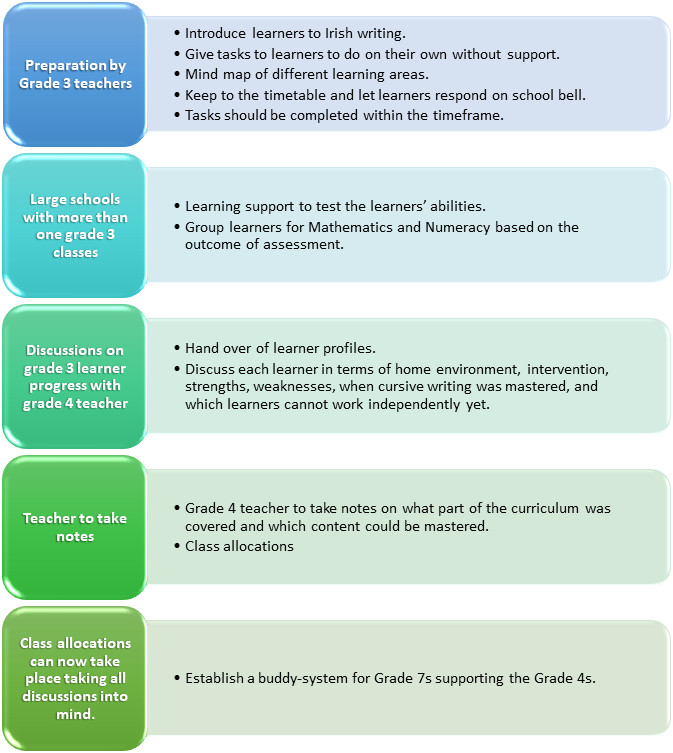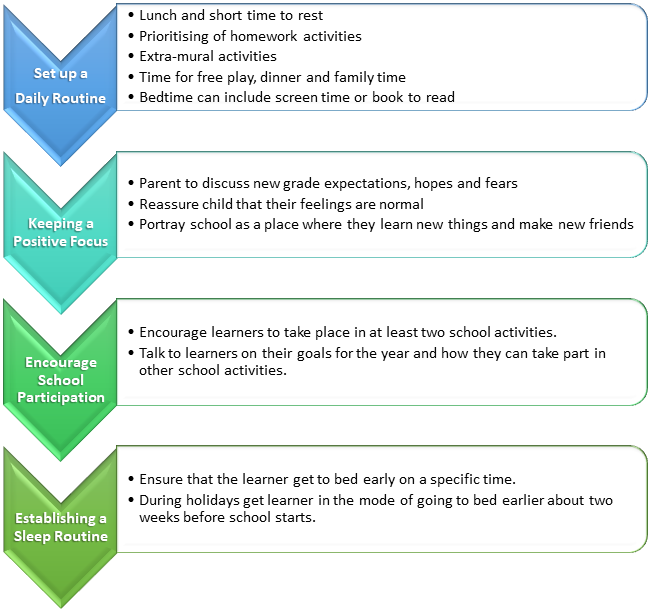
Bridging Grade 3 to Grade 4
Experience has taught that if the impact of progressing from Grade 3 to 4 could be minimised, learners tend to adapt to the new Intermediate Phase environment quicker. The Western Cape Education Department (WCED) would like to suggest the following strategy, within the unique context of each school, to support learners, teachers and parents with this process.
We welcome you and your child to the Intermediate Phase (grade 4 to 6). This phase comes with exciting new opportunities for your child, but also requires that they take more responsibility for their own learning. We would like to give you a glimpse of what the next three years will offer your child and how you can support them to achieve academic success.
Instructional Time per Subject
The instructional time per subject in the Intermediate Phase is as follows:
|
Subjects
|
Hours per calendar week
|
|
Home Language
|
6 Hours
|
|
First Additional Language
|
5 Hours
|
|
Mathematics
|
6 Hours |
|
Natural Sciences and Technology
|
3,5 Hours
|
|
Social Sciences
|
3 Hours
|
|
Life Skills:
|
4 Hours
(3 x 1,5 Hours)
|
|
Total
|
27,5 Hours
|
Models of Teaching
Your child may be taught with different models. Some schools will have class teaching, where one teacher teaches all the subjects indicated in the table above. Another school may offer subject teaching, where your child is taught by more than one teacher specialising in certain subjects.
Learners will be faced with the following changing circumstances at school:
- Adjusting to an increased amount of homework of varying nature.
- Becoming more attuned to subject-based learning.
- Adjusting to a more structured daily school routine.
- Becoming more familiar with recording homework, school regulations and mottoes, timetabling, lunch arrangements, personal hygiene, packing school bags, using learning packages, exercise books and textbooks, school assembly schedules, and extracurricular activities.
- Becoming progressively accustomed to new learning experiences and assessment methods including revision, dictation, tests, examinations, spelling and sentence writing, etc.
- The curriculum also requires children to do research for their subjects. According to the Curriculum and Assessment Policy Statement, “Children must be able to do work on their own and think on their own. It encourages critical thinking; learners must discover things by themselves.”
Some learners may be challenged by the following:
- Male teachers
- More than one teacher
- Teaching taking place in different classrooms
- Classrooms being less conducive for learning – fewer wall charts, references, etc.
- More formal teaching and learning
- The teaching of conceptual concepts is less concrete
- Whole-class teaching
- Different class arrangement – desks in rows, not groups
- Less learning through play – less interaction
- Possible change in Language of Learning and Teaching (LoLT), which poses a great challenge
The following guidelines can be implemented by teachers to prepare learners for grade 4:

The following guidelines can be implemented by parents to assist their child transitioning into grade 4.
Setting routine at home

Important Markers

See the following documentation for more information about assisting learners with the transition from grade 3 to 4.
- Bridging grade 3 to 4: The Strategy
- Bridging grade 3 to 4: The Presentation
- Bridging grade 3 to 4: The Booklet
- Bridging grade 3 to 4: The 2024 Minute
- Bridging grade 3 to 4: GET 0008/2024 - Annexure A
- Bridging grade 3 to 4: GET 0008/2024 - Bylae A
- Bridging grade 3 to 4: GET 0008/2024 - Isihlomelo A
Do you have an educational app, video, ebook, course or eResource?
Contribute to the Western Cape Education Department's ePortal to make a difference.


